What Does “Boston Strong” Mean 10 Years Later?
The saying helped unite a broken-hearted city when we needed it most. Do we still need the phrase?
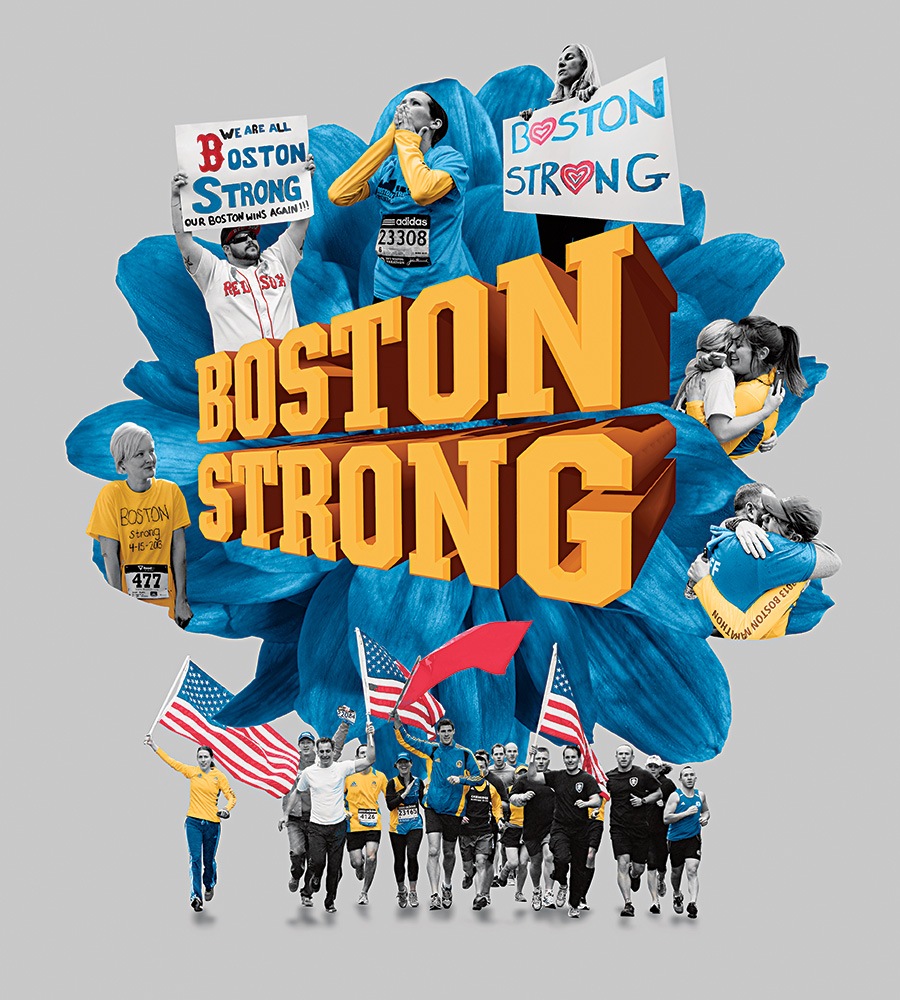
Illustration by Benjamen Purvis / Getty Images
Walking around Copley Square the day after the bombings, MBTA police officer Dic Donohue could hardly believe his eyes. He’d spent so much time in the neighborhood over the years: It was part of his beat as a cop, after all, and part of his personal life, too—he’d even had his first date with his wife at the old Whiskey’s dive bar across from the Pru. Yet as he began his first shift after the attacks on Tuesday, April 16, he was caught off guard by the sight of Boylston Street, ordinarily one of the city’s busiest corridors, “completely shut off,” he says. It was “totally weird, a vacuum.”
Vacuum: a space devoid of matter. It was a fitting description of a stunned community in those first days of horror, shock, and fear. As Donohue went about his business in the hazy aftermath of the attack, he also noticed a general surge in comradery across the city. When all days off were canceled for police officers that week, leaving him and his wife in need of childcare for their young son, Richie, their daycare center readily agreed to take the child on an unscheduled day. He was also moved by a newspaper story about Emerson College students Nicholas Reynolds and Chris Dobens, who were raising money for bombing victims by selling T-shirts with the words “Boston Strong” emblazoned on them. “I said, ‘Oh, that’s great, the city’s coming together,’” Donohue recalls. “People wanted to do good.”
Days later, Boston Strong became even more meaningful for Donohue: After getting caught in the crossfire during the chaotic shootout with the Tsarnaev brothers in Watertown early Friday morning, he wound up in the hospital for nearly two months, recovering from a gunshot wound that nearly cost him his life. As he passed the days in that tiny bed, he felt overwhelmed by the amount of physical and emotional support he received from friends and strangers alike.
During and after his hospital stay, Donohue says, he and his young family were inundated with acts of kindness. Everyone from the police chief to the mayor brought groceries to their home. Fellow police officers covered shifts for Donohue’s brother, a Winchester cop, so he could visit. Complete strangers offered to babysit. Ex-cops he didn’t know shared their stories of recovery from gunshot wounds and urged him to reach out if he wanted to talk. A college classmate and her husband sent him a homemade book full of gift cards for movies and restaurants as a reminder of happier times ahead. Jordan’s Furniture even paid for a bed to be installed on the first floor of Donohue’s home so he didn’t have to climb stairs.
As he endured the slow and agonizing process of rehab and recovery, Donohue says he came to appreciate how a phrase like Boston Strong—which was taking on a life of its own—could fill the black hole of pain and despair with “a huge, huge outpouring of support.” It was a crash course in how “a regular Joe like me could be supported by the community and strangers,” he says. “That was amazing—I would say lifesaving for me and my family.”
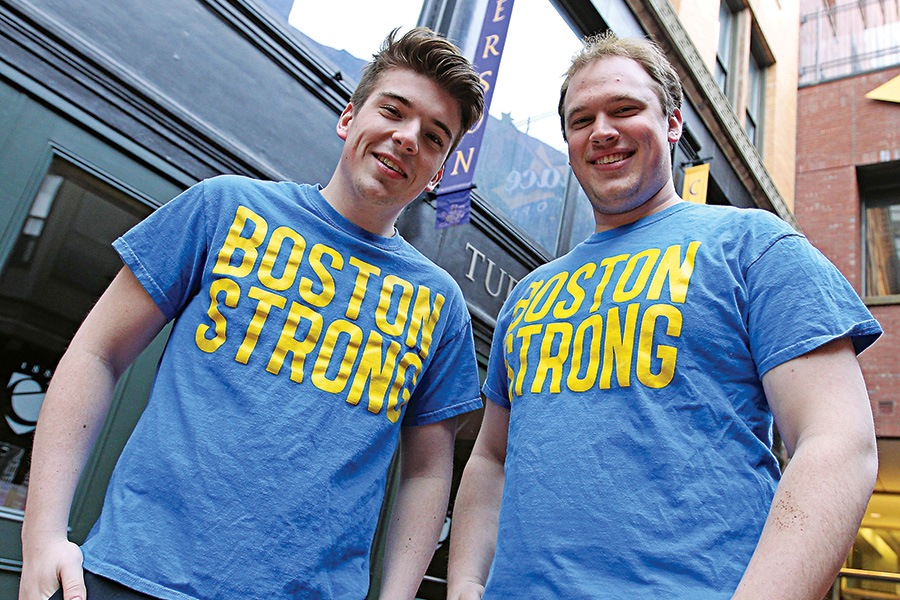
Emerson College students Chris Dobens and Nicholas Reynolds jumpstarted the phenomenon by selling T-shirts emblazoned with the slogan. / Photo by MediaNews Group/Boston Herald via Getty Images
That was what the Boston Strong slogan was all about in those early post-bombing days—recognition of victims’ and first responders’ courage as well as a unifying rallying cry. It helped fuel the nearly $80 million in victim aid raised by the One Fund, with $1 million of it coming from the Emerson T-shirt sales alone. Its spirit also enabled widespread compliance with the April 19 shelter-in-place advisory that emptied the streets in Watertown and surrounding towns as the cops closed in on the bombers.
In the mold of President George W. Bush vowing revenge through a bullhorn atop the smoldering rubble of the Twin Towers after 9/11, the phrase also quickly came to symbolize the city’s anger and defiance over its defilement, representing both a helping hand to survivors and a middle finger to the perpetrators. As President Barack Obama said in his remarks at a prayer service for the victims: “Your resolve is the greatest rebuke to whoever committed this heinous act.”
Ten years on, it’s been a long, strange trip for Boston Strong. The phrase has proven to be both beautiful and banal, traveling practically anywhere violence or natural disaster strikes with community displays of “[Insert your city here] Strong.” The line appeared in Orlando after the fatal shooting of 49 people at the Pulse nightclub in 2016, in Las Vegas after the killing of 58 people by a sniper on the Strip in 2017, and in Parkland, Florida, after the murder of 17 people at Marjory Stoneman Douglas High School in 2018. It is still invoked by contemporary tributes, such as January’s unveiling of a portrait of Spencer the Boston Marathon dog, a handsome golden retriever famous for greeting runners along the route. Shrugging off the effects of inoperable cancer, Spencer posed proudly for photographers with a Boston Strong banner in his mouth. (Sadly, he passed away in February.)
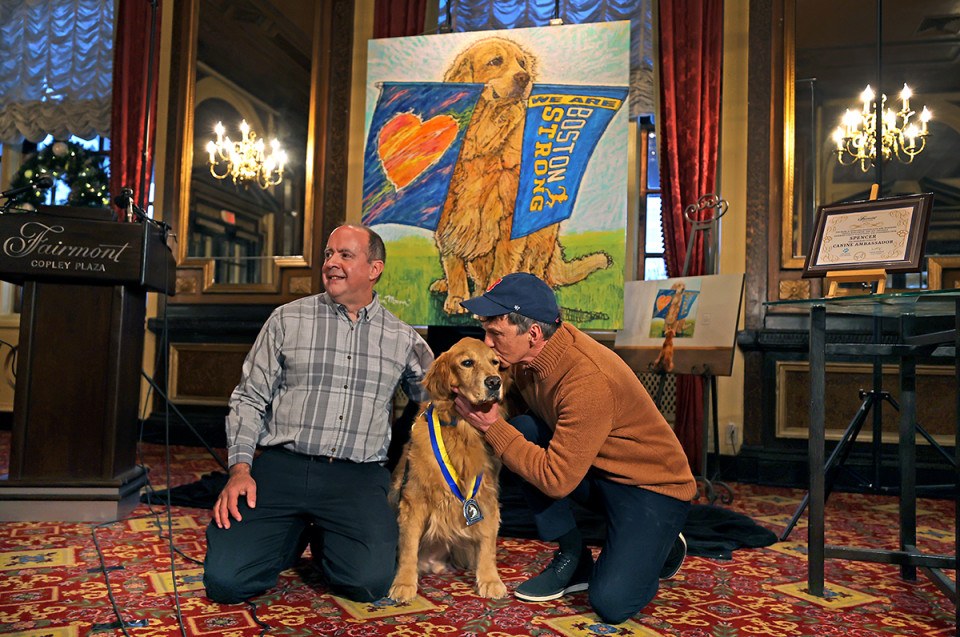
Spencer and his owner Rich Powers, left, with the artist Tom Mosser at the Fairmont Copley Plaza in January. / Photo by David L. Ryan/The Boston Globe via Getty Images
At the same time, the years have also taken their toll on Boston Strong. It has been exploited, expropriated, even excoriated. And efforts to consecrate it as a lasting insight into the city’s soul—and a spiritual guidepost to its post-bombing future—have proven to be hard promises to keep.
Boston Strong has proven to be both beautiful and banal, traveling practically anywhere violence or natural disaster strikes.
The phrase on the tip of every Bostonian’s tongue the week after the bombings wasn’t exactly new. As the Emerson students who popularized it readily admitted, the template for Boston Strong had been used years earlier by cyclist Lance Armstrong’s Livestrong Foundation as a fundraising tool for cancer patients and by the U.S. Army in its “Army Strong” recruiting slogan. Still, every catchphrase has an inflection point, a time when it stops simply being words and takes on a life of its own. For Boston Strong, that happened fast. Looking for a way to spark community fundraising for the victims, the mayor’s office had decided to send out tweets using the social media hashtag #OneBoston. But when Mayor Thomas Menino saw #BostonStrong trending on Twitter, he quickly decided to embrace it. “It was the best decision we made,” recalls Dot Joyce, his press secretary at the time.
The mayoral endorsement was just what Boston Strong needed to truly take off. In the days after the tragedy, legions of Bostonians held signs with the phrase in the stands of Bruins and Red Sox games. Soon, Boston Strong was popping up everywhere—on hats, ribbons, and an armada of T-shirts. It flashed on LED signs on the front of MBTA buses and overhanging the Mass. Pike. And in a sign of the early commodification of the term, there was a flurry of (ultimately unsuccessful) efforts to trademark it by purveyors of knickknacks, coffee, and beer. Meanwhile, when a star-packed Boston Woodstock fundraiser featuring the likes of Aerosmith, Dropkick Murphys, and J. Geils Band was set for late May, the title wrote itself: “Boston Strong: An Evening of Support and Celebration.”
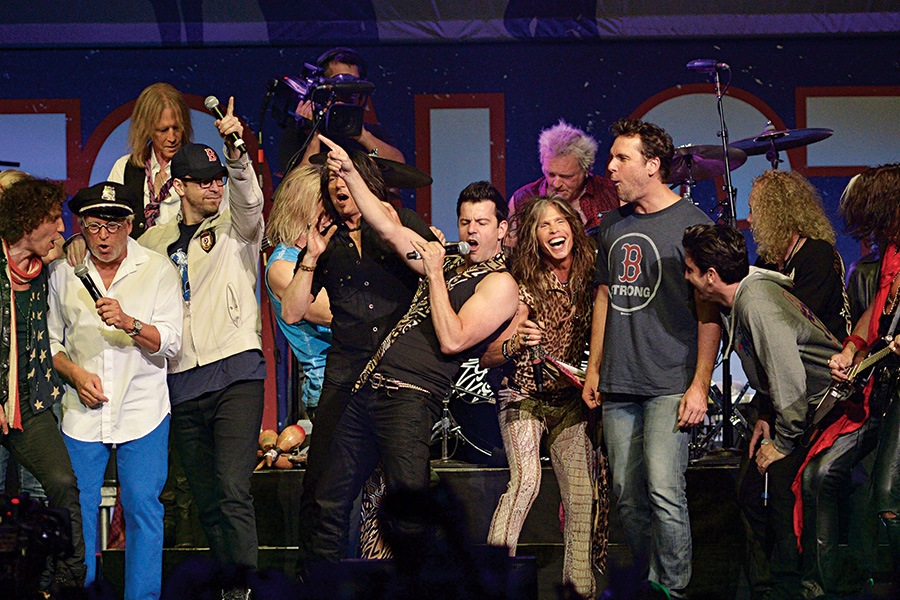
A celeb-studded fundraiser in May 2013 also highlighted the phrase in its name. / Photo by Paul Marotta/Getty Images
It wasn’t all T-shirts and star-studded concerts: Boston Strong also inspired many genuine acts of kindness during a terrifying time for the city. That included an outpouring of support for out-of-town runners and spectators who found themselves suddenly stranded after multiple hotels near the crime scene were evacuated. Locals such as Heather Carey, who had a spare couch, rushed to help. “We figure this is the least we can do,” she told CNN. “I saw a website with many others offering their spaces like we did. It is awesome to see so many people helping.”
In an era where no good deed goes unpunished on social media, though, the phrase also generated some controversy. It didn’t take long after the marathon attack for sports fans from other cities to mock it; at a Bruins playoff game in Toronto less than a month after the bombings, a Maple Leafs fan waved a sign that read “Toronto Stronger.” When Red Sox players laid their World Series trophy and a “Boston Strong” jersey at the marathon finish line following their win in October 2013, HBO talk-show host Bill Maher cried foul. “Three people died, that’s terrible, more were maimed, that’s horrible, but unfortunately, that happens every day, in car accidents and everything else,” he opined. “I mean, your city was not leveled by Godzilla.”
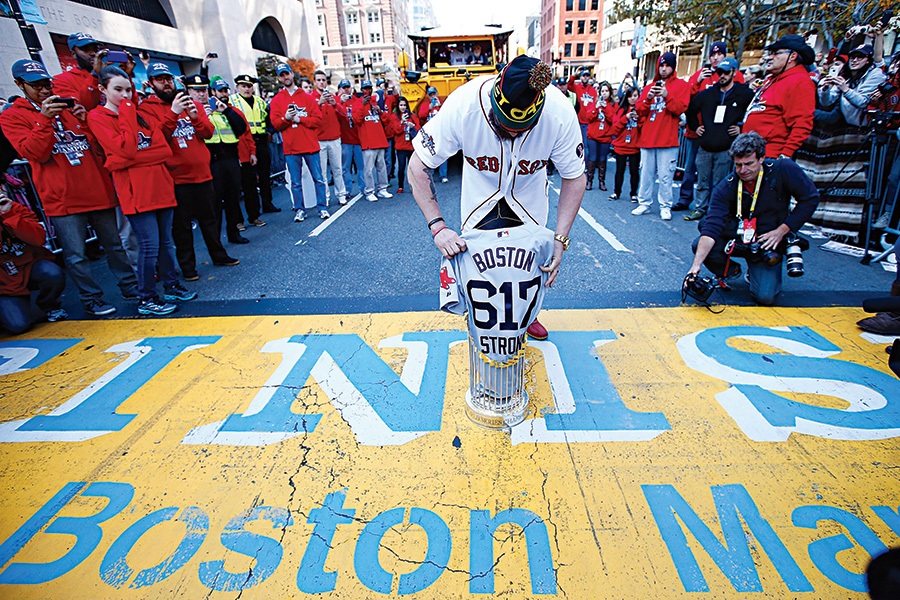
Former Boston Red Sox left fielder Jonny Gomes laying the World Series trophy and Boston Strong jersey at the finish line in October 2013. / Photo by Jared Wickerham/Getty Images
Some of Boston’s Black leaders also felt a level of discomfort with the slogan. For all of his shock and horror over the violence at the finish line, Reverend Eugene F. Rivers III couldn’t help but compare the outpouring of support and mobilization with the silence that typically ensues after violence strikes neighborhoods like Dorchester. “There was a whispered racialization that was implicit in Boston Strong,” says the longtime community activist. “This was a marketing campaign that was created to reassure the white public.”
By the fall of 2013, Boston Strong fatigue seemed to be setting in citywide. “So tired of ‘Boston Strong,’ but still inspired by the resilience of so many of those wounded in the marathon bombings,” tweeted then-Globe reporter Wesley Lowery, who had covered the aftermath of the attack. “For me, ‘Boston Strong’ is a commercialized catchphrase.” Even before Sox players staged their Boston Strong commemoration during the World Series celebration, local writer Luke O’Neil opined that linking sports to the phrase six months later was “insufferable and infantile…unless a home run is going to blast someone’s legs back on, I fail to see what rallying around a completely unrelated sports team has to do with the tragedy of the Boston Marathon bombing.”
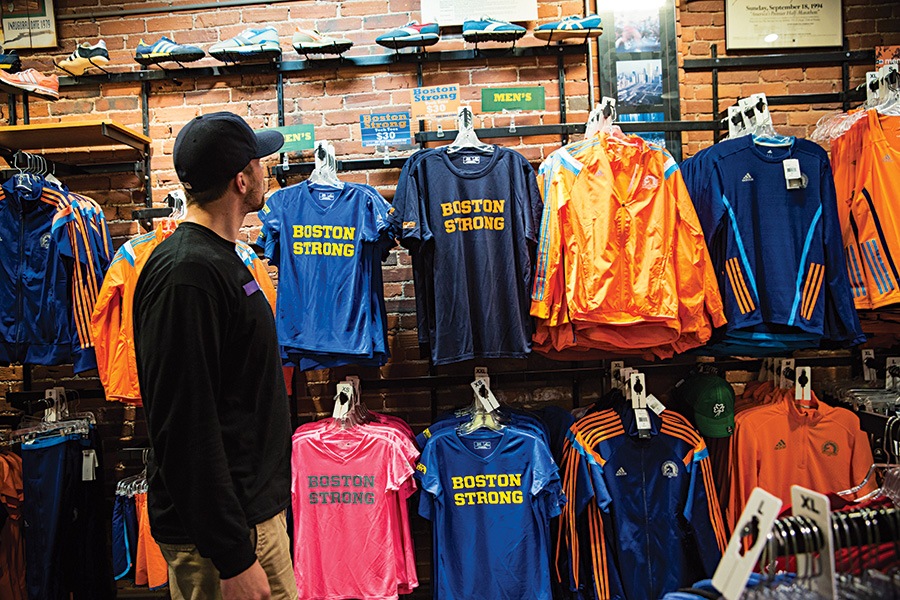
Boston Strong shirts were still for sale inside Marathon Sports a year after the bombings. / Photo by Andrew Burton/Getty Images
If there was a single moment in time that epitomized Boston Strong, it was the day after Dzhokhar Tsarnaev’s dramatic capture, when thousands of anguished Red Sox fans emerged from the shutdown and descended on Fenway Park for a particularly meaningful home game. Emotions in the stands were running high as David Ortiz, clad in red-and-white sunglasses, stood on the field with a microphone to memorialize victims of the attack before the first inning. “These jerseys that we’re wearing today, they don’t say Red Sox. They say Boston,” said Big Papi to thunderous applause. Then he delivered his famous line: “This is our fucking city, and nobody gonna dictate our freedom. Stay strong.” Spoken from the heart, those 13 words demonstrated the power of Boston Strong to move grown Massholes to tears, command respect from our customary detractors (“We stand united,” declared signs at Yankee Stadium earlier that week), and even cow the Federal Communications Commission into excusing Big Papi’s live-on-air F-bomb. But 10 years later, are Bostonians still standing united and strong?
Hard evidence that the marathon bombings jump-started a surge of social unity and progress is scarce. The Boston of the pandemic era, for instance, has been notably less willing to set aside personal freedoms for what was largely considered the common good. In 2021, hundreds protested against mask and vaccine mandates in front of the State House, and the following year, some of the city’s first-responder unions protested against and sued to overturn vaccine requirements.
And how about those generous offerings of a room at the inn for those displaced by the attacks—were they the start of something bigger? Sadly, no. Study after study shows that we have made little to no headway over the past decade in dealing with income inequality, economic immobility, and poverty in the city. In fact, last year’s Greater Boston Housing Report Card from the Boston Foundation concludes housing access here remains segregated by race and income. For someone like Rivers, who’s spent decades rallying the resources of the city’s white power structure to help quell the poverty afflicting many Bostonians of color, Boston Strong was and continues to be “an exclusionary concept.”
Maybe so, but only if a simple fundraising slogan, spawned by a unique moment in time, could reasonably have been expected to turbo-charge the pace of social and political change. Even 9/11 couldn’t pull that off. Polling by the Pew Research Center found that a month after that tragedy, trust in the federal government reached a modern-day high of 60 percent. Ten years later, it had collapsed to less than 20 percent. Pew’s conclusion: “The ‘9/11 effect’ on public opinion was short-lived.”
So what has become of the phrase in recent times? Search the hashtag #BostonStrong today on Twitter and prepare to be dismayed at how something so inspirational can become so insipid. It is a routine flex for local sports fans (“Let’s go Celtics! #BostonStrong”) and a sarcastic vehicle for political rhetoric (“It’s funny how Americans aren’t ‘strong’ enough to end the deadly illegal post-9/11 wars”). The Boston Strong hashtag is used to expand the reach of a help-wanted ad (“We would like you to join our team as our Marketing Director”), praise a Bell Biv DeVoe performance of the national anthem at the NHL Winter Classic (“a job well done”), and help peddle a cannabis domain name (“617420.com can be yours”).
Still, the emotional tug of Boston Strong lives on, exemplified by last year’s marathon, when two living symbols of courage and resiliency—survivor Adrianne Haslet, who lost a leg in the bombings, and Henry Richard, whose brother Martin was killed—ran and finished the race. But while some of those closest to the legend of Boston Strong extol its legacy, they also acknowledge its limits. “I thought it was a wonderful, powerful response that we are not going to be cowed,” says Rikk Larsen, a longtime Boston Athletic Association member who was near the finish line when the bombs exploded. Once its fundraising purpose was fulfilled, “it was diluted because there was not necessarily a specific action connected with it. It was a very appropriate response whose relevance declined over time.” Adds Dic Donohue: “There was a time and place for Boston Strong, but it certainly did become commercialized. You see T-shirts for sale at Logan 10 years later—what does that do?” Even a man who still deals with daily pain from his wounds a decade later acknowledges that “we’re not going to be affected by this event every day of our lives.”
Or are we?
Iconic Boston author Dennis Lehane wrote in a New York Times column days after the bombings that “two different friends texted me the identical message yesterday: They messed with the wrong city. This wasn’t a macho sentiment. It wasn’t ‘Bring it on’ or a similarly insipid bit of posturing…. No, what a Bostonian means when he or she says, ‘They messed with the wrong city’ is ‘You don’t think this changes anything, do you?’”
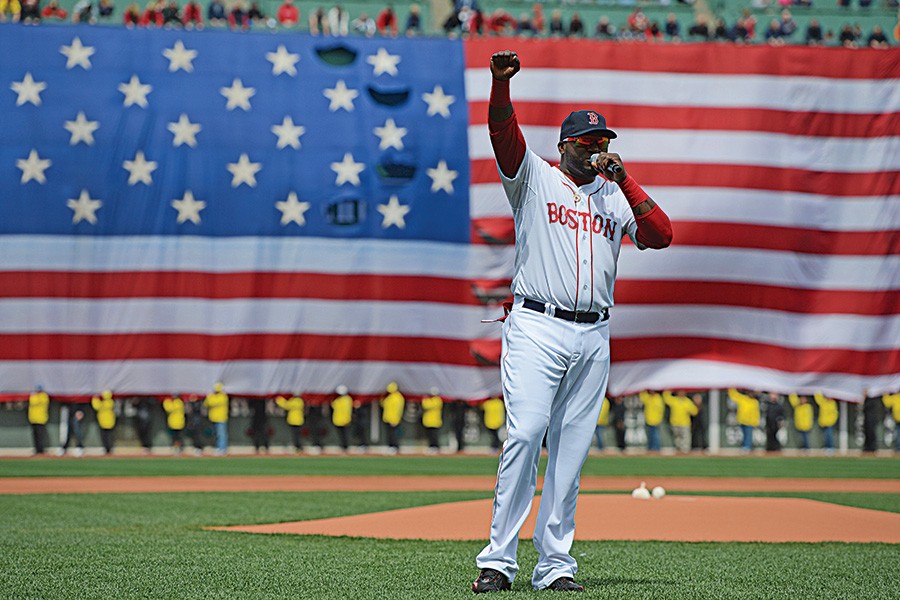
Big Papi’s iconic speech at the post-bombings Sox game was the epitome of Boston Strong. / Photo by Michael Ivins/Boston Red Sox/Getty Images
If the past few decades have taught us anything, it’s that “our fucking city” won’t let anything get in the way of its uncanny knack for reinvention—from stagnant urban backwater to thriving talent magnet, from stark segregation to majority non-white diversity, from a decaying shell of past glory to a national model of progressive urban management. And even if the slogan failed to become the catalyst for change that some had hoped, the past decade in Boston has still been one of progress, with new, very different political leadership across the mayor’s office, City Council, and Beacon Hill.
So perhaps the best way to remember Boston Strong is not as an unqualified success or unmitigated disaster but rather the starting point for an uncertain but promising journey ahead, imbued with the same mix of communal awareness and optimism that suffuses the marathon starting line in Hopkinton. And, like the city it extols, a work in progress. Says Dot Joyce: Boston’s “ability to reinvent itself when change presents—that’s the epitome of Boston Strong.”
First published in the print edition of the April 2023 issue with the headline “Once Upon a Time, We Never Needed the Words ‘Boston Strong.'”


